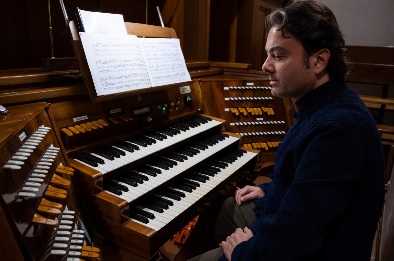Organ improvisation master Giampaolo di Rosa: „I believe in God, this is my way, and I‘m sure about that“
PUBLICATIONS
5/1/20233 min read
One of this year's „Resurrexit“ festival guests was a prominent organist, composer, improviser, academic, and a well-rounded musician from Italy – Giampaolo di Rosa. He presented his improvisational, and composition skills to the audience during a concert at the Church of the Immaculate Conception of the Blessed Virgin Mary in Šiauliai, and presented a talk on organ improvisation at the conference „Religious Music: Art, Science, Practice“. It‘s thrilling to hear this musician‘s work but in addition to that I invite you to find out more about his ideas on music, and outlook on life in general, so let‘s meet Giampaolo di Rosa.
You visited the 40th „Resurrexit“ festival this year. What is your first impression of the festival? Was this your first time in Šiauliai?
The festival is magnificent and perfectly organized. I came from Italy for this concert exclusively to Šiauliai. It has been very nice to know the city, and its people for the very first time.
You are a master of improvising while playing the organ and the listeners in Šiauliai got to hear that. Did you have a program planned, and rehearsed before coming, or was it all improvised?
Like every musician, I practice daily. If you want to perform well, rehearsing intensively at the concert venue is a must. The program was planned with Vita Butvilienė before coming to the festival, based on some of my repertoire (Johann Sebastian Bach, Domenico Scarlatti, Franz Liszt) and including improvisation.
Could you tell the readers which composers inspire you the most? Which music pieces could you play at any concert, any time and it still excites you, or do you prefer to change compositions along the way so that every program would be new and fresh for you too?
For sure Ludwig van Beethoven! His music is unique. That‘s why I arranged some of his piano sonatas for the organ. On the other hand, I‘m used to playing music composed over many centuries, exploring how music changed, and always discovering new meanings of the musical works. Of course, if we think of Johann Sebastian Bach, Wolfgang Amadeus Mozart, César Franck, Franz Liszt, Olivier Messiaen, and others... they are monumental evergreen stones!
You‘ve played many different organ instruments in various churches in Western Europe so you definitely have the expertise and the feel for an instrument. What do you think about the organ you played during your concert in Šiauliai? Each instrument is designed, built, and situated in the church a bit differently so could you share what is your experience and initial thoughts on this particular organ?
I used to play all over the world, and every organ, ancient, romantic, or modern, is different, therefore unique. As I told the students and the audience of the conference, the organ I played in Šiauliai is a fine one, quite large and colorful, being possible to play a huge landscape of organ music, with outstanding results.
Speaking of your talk at the conference, one thing you mentioned stuck with me. You said that the teaching of organ improvisation in Germany or in Italy is quite different. Could you share about this more? How students are taught to improvise while playing the organ?
Improvisation may be considered easy or exceptionally difficult. It depends on the approach. There are many traditions, developed in the liturgy and for concert purposes, like the improvisation of a piano cadenza. Every educational system teaches this subject in many different ways, in accordance with the student, the teacher, the subject itself, and other related factors. Some schools strongly developed some skills during their histories, others less. For improvisation, in general, and in the organ field, my advice is that everyone has to develop a creative path, based on the knowledge of the music, which is also written, not only improvised. Listening, analysing, and performing are needed, but it is essentially important to be creative. And it takes a long time to develop. It takes a lifetime.
It seems to be such a traditional instrument that has rules and regulations since it‘s usually found in churches or great concert halls and it all seems very heavy and dense but you presented the listener with the idea that playing organ could also be very creative and freeing. Could you share a bit more of your own thoughts about that?
Technical skills, logical thinking, and a creative approach – all are important. Also, a human being is involved in the moment of music making, and listening. It‘s not just about aesthetics, everything is there. Everything is linked together: music, and everything else, especially philosophy and art, theology and literature, mathematics and science. Enjoy it all, and be happy!
You have a lot of talents and occupations, you are a professional musician, composer, music theoretician, improviser, lecturer, and many more. What drives you to keep digging deeper, and keep finding more ways to love and share music?
I believe in God, this is my way, and I‘m sure about that.
I invite you to improvise intellectually on the topic. Do you think that festivals like these are making any difference in the lives of listeners, musicians, and everybody who gets involved, or maybe festivals and concerts are there just for the purpose of entertainment?
Art is communication.
Communication is understanding.
Understanding is (should be!) the way human beings are living and loving.
Art is τέχνη, and an artist is καλλιτέχνης.
It means that every person can create something nice, beautiful, and amazing, through material and technical skills.
That‘s what we do, that‘s our life!


